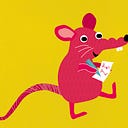How to Be Happy #30: Good Humor, Man
Last week, we started watching the lectures from “Take My Course, Please! The Philosophy of Humor,” which we signed up for through the Great Courses website. In the introduction, “The Universality of Humor,” Steven Gimbel, a professor of philosophy at Gettysburg College, explained the origin of the word “humor.” It goes back to the ancient Greeks and Romans, specifically the Greek Hippocrates, who came up with the idea of the four humors, and the Roman physician, surgeon, and philosopher (geez, can’t they just pick one thing and stick to it?) Claudius Galenus, or Galen for short, who spread and popularized the concept of humorism as part of his theories of the three varieties of pneuma or vital energies.
You might want to sit down for this. Feel free to pause for a stretch or take a bathroom break if needed.
To Galen, the pneuma (air) was the breath of the cosmos and could be modified by the actions of the liver, heart, and brain before being distributed through the body via veins, arteries, and nerves to provide for growth and nutrition and “vivify” the body. What circulated through the body were four types of liquid: yellow bile, black bile, blood, and phlegm. He associated these liquids with a specific element and a specific temperament: yellow bile (fire and choler), black bile (earth and melancholy), blood (air and sanguinity), and phlegm (water and, well, phlegmity).
Things get rather complicated from there with discussions of seasons, ages, elements, organs (liver, gallbladder, spleen, brain/lungs), qualities (warm and moist, warm and dry, etc.), and the aforementioned temperaments.
Suffice it to say that the ideal to pursue was to have the four humors balanced, that is, none in dominance. Such a person would be in “good humor.” When people were ill, Galen attempted to diagnose which humor was out of balance and then fix it. Too much blood? Bring out the leeches! Too much black bile? Bring out the cod liver oil (to induce vomiting) or the enema tube (to, well, you know)!
Writing for the Science Diction podcast from Science Friday (an NPR show we love), Johanna Mayer unravels the humorous history further in her article “The Origin of the Word ‘Humor.’” She tells us that the first known use in English (Middle English) of the word occurred in 1340. She cites examples from Shakespeare’s The Taming of the Shrew and Ben Jonson’s Every Man in His Humour to show how playwrights created characters based on specific humors. Kate and Petruchio were cholerics, for instance, overflowing it seems with yellow bile that made them aggressive and combative and to say things like “if I be waspish, beware my sting.”
Mayer makes an interesting point about all of this, saying the humorist take on physiology “was the first organized theory that indicated that illness stemmed from natural causes, rather than something supernatural or cosmological.”
Eventually, according to etymonline.com, “humor” came to refer to someone’s mood or temporary state of mind (1520s or thereabouts) and then to represent an “amusing quality, funniness, or a jocular state of mind.” From there, we have the action of humoring someone or being “good humored.”
Mayer notes the humor, or the laughter associated with it, is primarily a social activity: “We’re 30 percent more likely to laugh when we’re around other people.” She quotes neurologist Sophie Scott as saying, “If you can in a difficult situation use laughter to make yourself feel more positive and less stressed, then that’s a very nuanced way of using laughter to actually negotiate yourself to a better place in terms of emotions.”
And there lies this blog’s lesson. Put less verbojargoniciously [using an overabundance of science-cliquey terms], “laugh to be happy.” And you thought I was going to recommend eating ice cream, didn’t you? I know you did. Just admit it and then go eat some oreo cookie dough and watch Schitt’s Creek. Might as well double down just in case, right?
(First Image: The four temperaments as depicted in an 18th-century woodcut: phlegmatic, choleric, sanguine, and melancholic. Public domain.)
